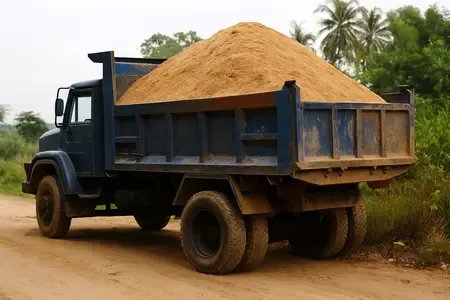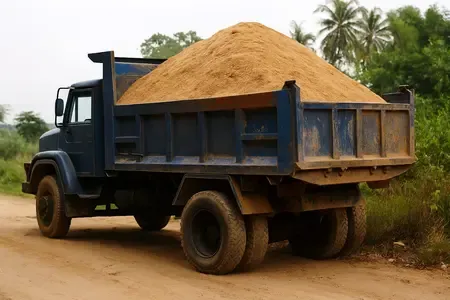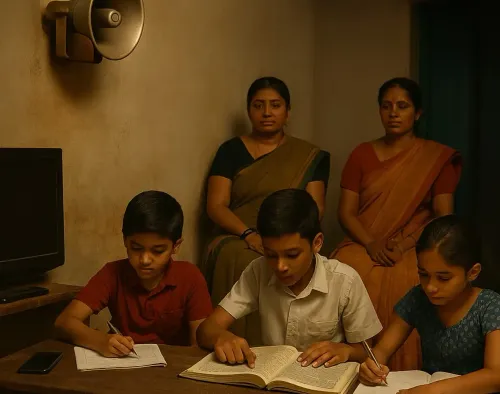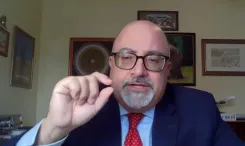Delhi 2024: A Year of Elections and Political Turmoil
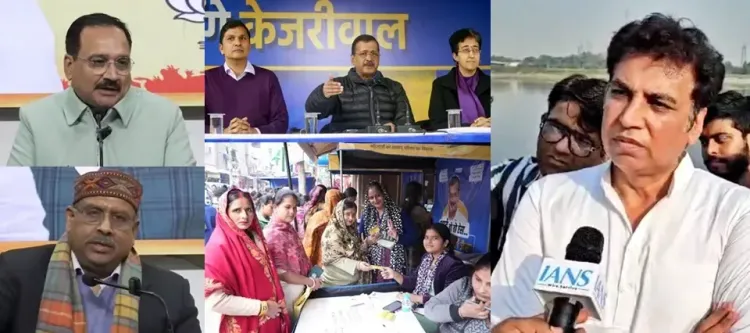
New Delhi, Dec 30 (NationPress) As a year marked by intense political rivalry and upheaval within Delhi's power structures concludes, the local leaders and inhabitants will persist in an election mindset, a trend that commenced with the parliamentary elections and will extend to the Assembly polls in February 2025.
In addition to paving the way for Modi 3.0, the year 2024 became a battleground for the AAP and BJP to attract voters ahead of what might result in Arvind Kejriwal 4.0 or BJP 2.0 post-Assembly elections.
While the possibility of a Congress government taking charge in Delhi again exists theoretically, it remains improbable due to the party's internal structural issues.
The re-election of Narendra Modi as Prime Minister for a third consecutive term this year, alongside the BJP's sweep of all seven parliamentary seats in Delhi, has bolstered the saffron party's ambition to reclaim dominance in the national Capital after a 26-year hiatus. The BJP has not achieved a majority in Delhi since gaining power in 1993.
The year also witnessed the 'Muffler Man' Kejriwal's temporary releases from jail—first for a few weeks to campaign during the Lok Sabha elections and later on bail due to slow progress by the ED in ongoing investigations—revitalizing the ruling AAP as it faced corruption accusations.
Kejriwal's and other AAP leaders' releases—including former Deputy Chief Minister Manish Sisodia, Satyendar Jain, and Sanjay Singh—in connection to money laundering cases tied to the alleged liquor policy scandal coincided with Kejriwal's resignation as Chief Minister in September.
New Chief Minister: The national Capital welcomed its second Chief Minister from the AAP, Atishi, presenting a new challenge for the party to justify this shift.
The party endeavored to garner voter sympathy stemming from Kejriwal's forced departure from the CM's role, yet opponents BJP and Congress maintained pressure through pointed inquiries about his tarnished reputation and suspected corruption.
The year also saw escalating political animosity among AAP, BJP, and Congress concerning matters like corruption and welfare initiatives, or 'revadis', such as free water, electricity, education, healthcare, and bus transportation.
Issues surrounding development, Yamuna pollution, toxic air, inconsistent water supply, inflated utility bills, blocked drainage, law and order challenges, illegal infiltrators, voter list manipulation, and the removal of bus security personnel contributed to the ongoing political tension.
The tragic drowning of three IAS aspirants in Old Rajinder Nagar in July also escalated into a significant political controversy, resulting in exchanges of blame between the ruling AAP and opposition parties.
The Constitution Day celebrations at the end of 2024 witnessed all three political factions vying to showcase their commitment to the achievements of Dalit icons, aiming to attract voters from marginalized communities.
The competition to appeal to Poorvanchali voters, who represent nearly 30% of the 1.5 crore total electorate, primarily residing in the 1,700 unauthorized colonies, prompted leaders from AAP, BJP, and Congress to spend time in these areas, celebrating Chhath Puja with constituents.
Slum dwellers, constituting a significant voting bloc, were also targeted by politicians who visited their communities around the anniversaries of Dr. Ambedkar's birth and death in April and December.
The Congress placed special emphasis on addressing challenges in the city's rural regions, particularly in areas dominated by the Jat community.
Throughout the year, the AAP celebrated the election of its Dalit candidate as Mayor of the Municipal Corporation of Delhi, while Congress found encouragement in the success of its student wing, NSUI, in winning the presidency of the Delhi University students' union after seven years, seen as a revival among younger voters.
The Delhi Congress President Devender Yadav's Nyay Yatra, inspired by Rahul Gandhi's nationwide march, created favorable optics for party supporters, who are eagerly hoping for a competitive three-way race in the upcoming Assembly elections.
Corruption in 'Sheesh Mahal': Throughout the year, the BJP consistently raised the corruption narrative against Kejriwal and AAP, setting the stage for a Modi vs. Kejriwal showdown in the Assembly elections.
‘Sheesh Mahal’—a term coined by the BJP for the renovated official residence, allegedly involving over Rs 52 crore in corruption—dominated political discussions throughout the year.
2024 will likely be remembered as the year that saw the polluted Yamuna gain unprecedented attention.
Delhi BJP President Virendra Sachdeva even took a dip in the polluted river ahead of Chhath, subsequently falling ill with skin allergies—a political stunt that drew significant public interest.
The city's air pollution, exacerbated by Diwali celebrations and stubble burning from neighboring states, put the AAP on the defensive, allowing rivals to successfully portray the Delhi government's failure to address the crisis.
Kejriwal's criticisms of the BJP-led Central government regarding women's safety and law enforcement were countered by the BJP, which questioned the alleged assault on AAP Rajya Sabha MP Swati Maliwal at the CM's residence.
The AAP National Convenor's visits to victims of severe crimes resonated with voters, although this initiative was halted due to an alleged attack on Kejriwal during his outreach efforts.
The rising political tension in the city was mirrored in the busy court activities involving the AAP government and its adversaries, along with the power-sharing disputes with Lieutenant Governor V.K. Saxena.
In addition to the ED investigations involving Kejriwal and other AAP leaders, courts were also occupied with issues related to air pollution and GRAP implementation, purportedly inadequate healthcare services, the introduction of the Ayushman Bharat PM-JAY health insurance scheme funded by the Central government, and the presentation of controversial CAG reports detailing the AAP government's financial management in the Legislative Assembly.
As the year comes to a close, the controversy surrounding the Mukhyamantri Mahila Samman Yojana emerged as a fitting finale to the ongoing conflict between AAP and its rivals.
The scheme aimed at providing Rs 2,100 per month to women was declared “illegal” by the very departments of her government, creating an unprecedented scenario that offered fresh ammunition to the BJP and Congress.
The New Year is set to bring a second election for Delhi residents within just nine months. The BJP's recent successes in Assembly elections in Haryana and Maharashtra have heightened expectations among its supporters that the 'Modi magic' will transform the city, concluding the party's long-standing absence from power for 26 years.
Furthermore, the outcome of the Assembly election, which will determine a new 70-member House, will significantly impact the future of AAP on the national stage, especially within the INDIA bloc.
For the Congress, there is little left to lose. The year 2024 served as a period for the party to regroup after the unsuccessful attempt to partner with the AAP during the parliamentary elections.


